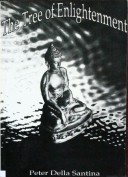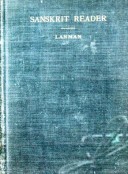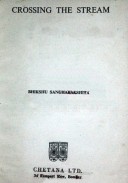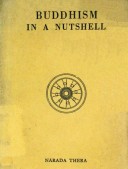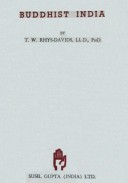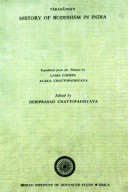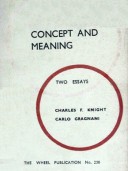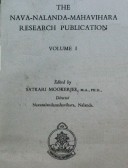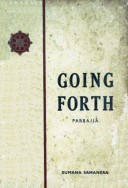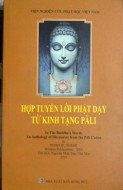Tìm Sách
Sách tiếng Anh-English >> The Tree Of Enlightenment
Thông tin tra cứu
- Tên sách : The Tree Of Enlightenment
- Tác giả : Peter Della Santina
- Dịch giả :
- Ngôn ngữ : Anh
- Số trang : 349
- Nhà xuất bản : Chico Dharma Study Foundation - California USA
- Năm xuất bản : 1997
- Phân loại : Sách tiếng Anh-English
- MCB : 1210000003679
- OPAC :
- Tóm tắt :
AUTHOR’S NOTE
From 1983 to 1985 when I was in Singapore engaged in the Buddhist studies project at the Curriculum Development Institute, I was invited by the Srilankaramaya Buddhist Temple and a number of Buddhist friends to deliver four series of lectures covering some of the major traditions of Buddhism. The lectures were popular, and thanks to the efforts of Mr. Yeo Eng Chen and others, they were recorded, transcribed and printed for limited free distribution to students of the Dharma. In the years since, the lectures which originally appeared in the form of four separate booklets have remained popular and have even been reprinted from time to time. Consequently, it seemed to me to be desirable to collect the four series of lectures in one volume, and after appropriate revision to publish them for the general use of the public.
In keeping with the original objectives of the lectures, this book is – as far as possible – non-technical. It is intended for ordinary readers not having any special expertise in Buddhist studies or in Buddhist canonical languages. Original language Sterols have therefore been kept to a minimum and foot notes have been avoided. Names of texts cited are sometimes left untranslated, but this is because the English renderings of some titles are awkward and hardly make their subject matter more Hear. In brief I hope that this book will serve as the beginning of its readers’ Buddhist education and not the end of it. The book can supply a general Introduction to the major traditions of Buddhism, but it does not pretend to be complete or definitive. Neither can I honestly affirm that it is altogether free from errors, and therefore I apologize in advance for any that may remain in spite of my west efforts.
A number of original language terms and personal names which have by now entered the English language such as “Dharma”, “karma”, “Nirvana” and “Shakyamuni” have been used throughout the book in their Sanskrit forms. As for the rest, Pali original language terms, text titles and personal names have been Retained in parts I and IV which are largely based on Pali sources, while Sanskrit original language technical terms, text titles and personal names have been used in parts II and III which are largely based on Sanskrit and Tibetan sources. Occasionally, this general rule has been ignored when the names of texts and persons referred to in a given context actually occur in another one of the canonical languages. In as much as Pali and Sanskrit are in most cases quite similar, I trust the average reader will have no difficulty in coping with this arrangement.
I owe a great debt to a very large number of people for the realization of this book. First and foremost, I would like to thank H.H. Sakya Trizin without whom my interest in Buddhism might well have remained superficial and merely intellectual. Next I would like to thank Yeo Eng Chen and many other members of the Singapore Buddhist community without whose help and encouragement the lectures would never have been delivered and the original transcripts on which this book is based never made. Then, I would also like to thank a great many friends and students in Asia, Europe and America who encouraged me to think the lectures might be useful for an even wider readership. Finally, I want to thank all those who have been involved in the actual preparation of the present book. They include, the members of the Chico Dharma study group, specially, Jo and Jim Murphy, Victoria Scott for her help with the manuscript, L. Jamspal for his help with the original language terms, my wife Krishna Ghosh for the many hours she spent checking the manuscript, and my son Siddhartha Della Santina for the cover design and formatting of the manuscript.
In conclusion, I would like to add that by offering this book to the public, the Chico Dharma Study Foundation hopes to initiate a program whereby Buddhist Studies materials may be made available free of commercial considerations to students of Buddhism through a variety of media. For the time being, the present book will be available not only in hard copy, but also over the internet. In the future, the Chico Dharma study Foundation plans to produce and make available important materials in the fields of Buddhist philosophy, practice and folk lore, including materials for children and young adults. We welcome the help of anyone who would like to contribute in any way to the educational activities of the foundation and we invite you to contact us with your suggestions.
Peter Della Santina
7 July, 1997 Chico, California, USA
CONTENTS
Author’s Note
Part One The Fundamemals of Buddhism
Chapter One Buddhism A Modem Perspective
Chapter Two The Pre-Buddhist Background
Chapter Three The Life Of The Buddha
Chapter Four The Four Noble Truths
Chapter Five Morality
Chapter Six Mental Development
Chapter Seven Wisdom
Chapter Eight Karma
Chapter Nine Rebirth
Chapter Ten Interdependent Origination
Chapter Eleven The Three Universal Characteristics
Chapter Twelve The Five Aggregates
Chapter Thirteen The Fundamentals in Practice
Part Two The Mahayana
Chapter Fourteen The Origins of The Mahayana Tradition
Chapter Fifteen The Lotus Sutra
Chapter Sixteen The Heart Sutra
Chapter Seventeen The Lankavatara Sutra
Chapter Eighteen The Philosophy of The Middle Way
Chapter Nineteen The Philosophy of Mind only
Chapter Twenty The Development of Mahayana Philosophy
Chapter Twenty-One Mahayana Buddhism in Practice
Part Three The Vajrayana
Chapter Twenty-Two The Origins of The Vajrayarta Tradition
Chapter Twenty-Three Philosophical and Religious Foundations
Chapter Twenty-Four Methodology
Chapter Twenty-Five Myth and Symbolism
Chapter Twenty-Six Psychology, Physiology and Cosmology
Chapter Twenty-Seven The Preliminary Practices
Chapter Twenty-Eight The Vajrayana Initiation
Chapter Twenty-Nine Vajrayana Buddhism in Practice
Part Four The Abidharma
Chapter Thirty An Introduction To The Abhidharma
Chapter Thirty-One Philosophy and Phychology in The Abhidharma
Chapter Thirty-Two Methodology
Chapter Thirty-Three Analysis of Conciousness
Chapter Thirty-Four The Form and Formless Spheres
Chapter Thirty-Five Supramundane Consciousness
Chapter Thirty-Six Analysis of The Mental States
Chapter Thirty-Seven Analysis of The Thought process
Chapter Thirty-Eight Analysis of Matter
Chapter Thirty-Nine Analysis of Conditionality
Chapter Fourty The Thirty-Seven Factors of Enlightenment
Chapter Fourty-One Abhidharma in Daily Life
.
 Facebook
Facebook
 Google
Google
 Google+
Google+
